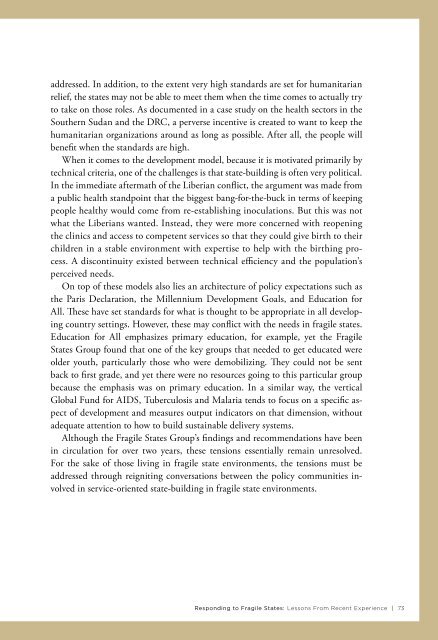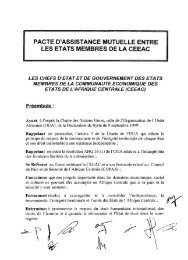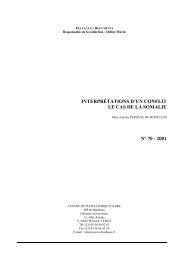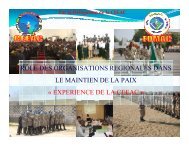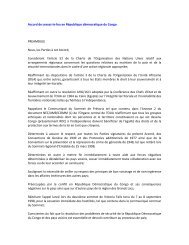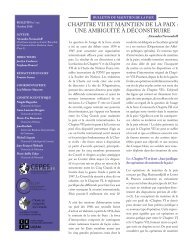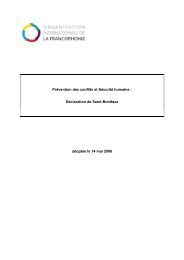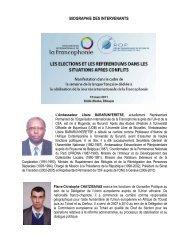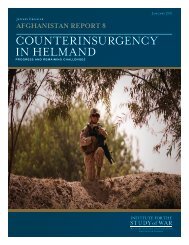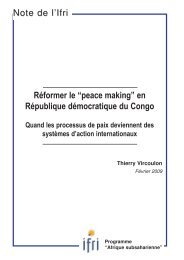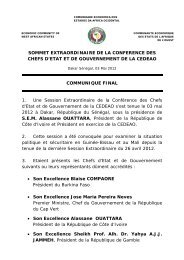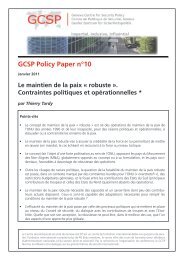engaging fragile states - Woodrow Wilson International Center for ...
engaging fragile states - Woodrow Wilson International Center for ...
engaging fragile states - Woodrow Wilson International Center for ...
You also want an ePaper? Increase the reach of your titles
YUMPU automatically turns print PDFs into web optimized ePapers that Google loves.
addressed. In addition, to the extent very high standards are set <strong>for</strong> humanitarian<br />
relief, the <strong>states</strong> may not be able to meet them when the time comes to actually try<br />
to take on those roles. As documented in a case study on the health sectors in the<br />
Southern Sudan and the DRC, a perverse incentive is created to want to keep the<br />
humanitarian organizations around as long as possible. After all, the people will<br />
benefit when the standards are high.<br />
When it comes to the development model, because it is motivated primarily by<br />
technical criteria, one of the challenges is that state-building is often very political.<br />
In the immediate aftermath of the Liberian conflict, the argument was made from<br />
a public health standpoint that the biggest bang-<strong>for</strong>-the-buck in terms of keeping<br />
people healthy would come from re-establishing inoculations. But this was not<br />
what the Liberians wanted. Instead, they were more concerned with reopening<br />
the clinics and access to competent services so that they could give birth to their<br />
children in a stable environment with expertise to help with the birthing process.<br />
A discontinuity existed between technical efficiency and the population’s<br />
perceived needs.<br />
On top of these models also lies an architecture of policy expectations such as<br />
the Paris Declaration, the Millennium Development Goals, and Education <strong>for</strong><br />
All. These have set standards <strong>for</strong> what is thought to be appropriate in all developing<br />
country settings. However, these may conflict with the needs in <strong>fragile</strong> <strong>states</strong>.<br />
Education <strong>for</strong> All emphasizes primary education, <strong>for</strong> example, yet the Fragile<br />
States Group found that one of the key groups that needed to get educated were<br />
older youth, particularly those who were demobilizing. They could not be sent<br />
back to first grade, and yet there were no resources going to this particular group<br />
because the emphasis was on primary education. In a similar way, the vertical<br />
Global Fund <strong>for</strong> AIDS, Tuberculosis and Malaria tends to focus on a specific aspect<br />
of development and measures output indicators on that dimension, without<br />
adequate attention to how to build sustainable delivery systems.<br />
Although the Fragile States Group’s findings and recommendations have been<br />
in circulation <strong>for</strong> over two years, these tensions essentially remain unresolved.<br />
For the sake of those living in <strong>fragile</strong> state environments, the tensions must be<br />
addressed through reigniting conversations between the policy communities involved<br />
in service-oriented state-building in <strong>fragile</strong> state environments.<br />
Responding to Fragile States: Lessons From Recent Experience | 73


